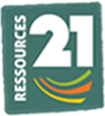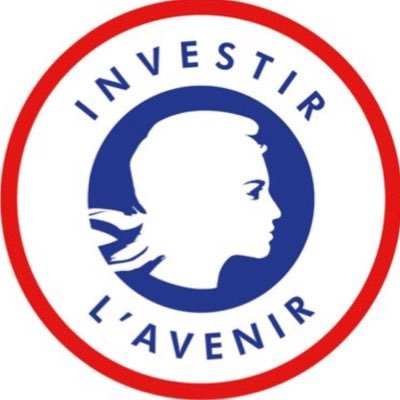LabEx RESSOURCES21: understanding and managing strategic metalsin the 21st century |
The constant growth of the world's population (9 billion people by 2050), the boom in and spread of new technologies, the energy transition, and the growing needs of emerging economies such as China and India are all contributing to an ever-increase demand for rare metal resources. In response to the potential threats to the supply of these critical metals (risk of disruption or shortage), the development of recycling has become a major economic and geopolitical challenge for all European countries. However, recycling alone is not sufficient, and securing access to primary resources remains a priority.
The Laboratory of Excellence RESOURCES21 (LabEx R21), funded as part of the French national programme "Investissements d'Avenir" is a strategic project for France. It was created in 2011 and then renewed for the period 2019-2024 with a global budget of approximately €13 million over the 14 years of the project.
LabEx R21 encourages structural approaches around the life cycle of strategic metals, geometallurgy, the development of portable exploration and analytical tools and the social, economic and territorial integration of mining project. Particular attention is given to new conceptual development and original new processes enabling the extraction of strategic metals from poor and/or polymetallic resources originating from mining or recycling. In particular, each stage of the value chain is represented in our research group by the integration of transversal topics, especially in the disciplines of human and social sciences on resource economics and territorial integration. Issues related to the conservation of biodiversity, monitoring and remediation of the environment are approached in order to promote the emergence of new mining strategies.
Overall projects of the LabEx R21 aim at better understanding the geochemical cycle of rare earth elements, nickel, lithium and gold with a particular focus on French Guiana, a French overseas department where gold prospective development meets our cross-disciplinary expertise.
Moreover, the LabEx R21 intends to support and to maintain the international relationships established over the last five years through the implementation of cotutelle or co-supervised doctoral research through partnerships with Australia, Canada, China and New Caledonia.
Through its activities, the Laboratory of Excellence RESSOURCES21 supports training through research to qualify RD&I managers by funding internships for Master students, postdoctoral internships and high-level doctoral research grants.
To meet the challenges that come along the problematics of ensuring the supply of strategic metals, the Laboratory of Excellence, “Strategic Metal Resources in the 21st Century - RESSOURCES21” is built around a team of multidisciplinary researchers from four Geosciences laboratories of OTElo (Observatoire Terre et Environnement Lorraine- Lorraine Earth and Environment Observatory) and 3 other laboratories of the Université de Lorraine (BETA -Economics, IJL and LRGP -Processes).
Centre de Recherches Pétrographiques et Géochimiques (CRPG, UMR CNRS, www.crpg.cnrs-nancy.fr/) is a laboratory of Earth and planetary sciences, strongly involved in fundamental research with broad scientific orientations on the formation of the solar system and the geological processes occurring from the earth’s formation to the Anthropocene era. The research teams bring together geochemists, petrologists and geologists in a combined approach including strong developments in geochemical instrumentation and isotopic geochemistry.
Laboratoire Interdisciplinaire des Environnements Continentaux (LIEC, UMR CNRS, http://liec.univ-lorraine.fr/) focuses its research activities in the fields of environmental physicochemistry, soil biogeochemistry and integrative ecotoxicology around a common objective: "Understanding and modelling anthropized continental ecosystems". With a broad and multidisciplinary vision of ecological and biogeochemical processes from the colloidal scale to that of a watershed, the laboratory devotes its strengths to the study of the functioning of continental terrestrial and aquatic environments, in connection with major challenges of the 21st century, i.e. ecotoxicological impact of new processes for energy production and resource recovery, anthropisation of soils and rivers, evolution of landscapes and disturbed ecosystems, etc.
Laboratoire Sol et Environnement (LSE, UMR INRA, http://lse.univ-lorraine.fr) focuses its research on the knowledge and engineering of strongly anthropized soils, and their remediation through soil construction and phytoremediation. LSE is particularly interested to study the impacts of anthropic constraints on soil resource (sharp increase of anthropization, highly-stressed environments for living organisms). The challenges concern the development of diagnostic tools, the development of agronomy and the design of ecological engineering processes for rehabilitate very anthropized environments and their soils. Agromining is a main research activity at the LSE, with the acquisition of basic knowledge (e.g. botany, ecophysiology of hyperaccumulators, behavior in harsh environments such as mine and industrial waste), and the development of the technology in close partnership with LRGP. The book “Agromining: farming for the future” Springer, 2018 is a co-edition of two members of the LSE and two other international members funded by the Labex.
GeoRessources (UMR CNRS, http://georessources.univ-lorraine.fr/) covers the whole cycle of resources, from exploration to post-mining, through processing and operation including risk management in mining operation as well. The expertise of GeoRessources allows working on the Challenges of the 21st century related to the sustainable and efficient recovery of resource and energy with a special attention to: (i) metallogeny of rare or critical metals for photovoltaic or wind energy systems, an Au-U ore systems, (ii) recovery of metals from primary and secondary resources (tailings, wastes, recycling of spent materials), (iii) carbon resources with unconventional deposits, (iv) pollutants in the environment (aquifers, soils, atmosphere), (v) low-enthalpy geothermal processes (CO2 storage, gas production) and (vi) high-enthalpy geothermal processes.
Laboratoire de Réactivité et de Génie des Procédés (LRGP, UMR CNRS, http://lrgp-nancy.cnrs.fr) has a robust expertise regarding separation and purification processes in aqueous solutions, as well as in the field of nickel phytomining. Two teams in charge of research activities related to hydrometallurgy will be involved in the Labex including researchers working on agromining processes and purification processes by precipitation and ion exchange processes.
Institut Jean Lamour (IJL, UMR CNRS, https://ijl.univ-lorraine.fr) is a Materials Science research laboratory. The team entitled Chemistry and Electrochemistry of Materials group (CEM) will be involved in R21. This team will use its expertise in the development of innovative hydrometallurgical processes at laboratory-scale using new technologies (coupling Electroleaching/Electrodeposition in a single-cell, Electrochemical Junction Transfer) or new reagents and new media (electrodeposition in Ionic Liquids, use of agro-resources for chemical leaching or precipitation).
Bureau d’Economie Théorique et Appliquée (Beta, UMR CNRS, www.beta-umr7522.fr) develops research in economics and management, based on a fruitful synergy between fundamental and applied research. Driven by social and economic evolutions, research topics cover nowadays law and economics, economics of energy, economics of forestry, and more widely the economic aspect of environmental and demographic transitions. Various methodological approaches are used: modelling techniques, cliometrics, econometrics, evaluation and forecasting methods, experimental economics…
View the research topics currently being developed by LabEx RESSOURCES21
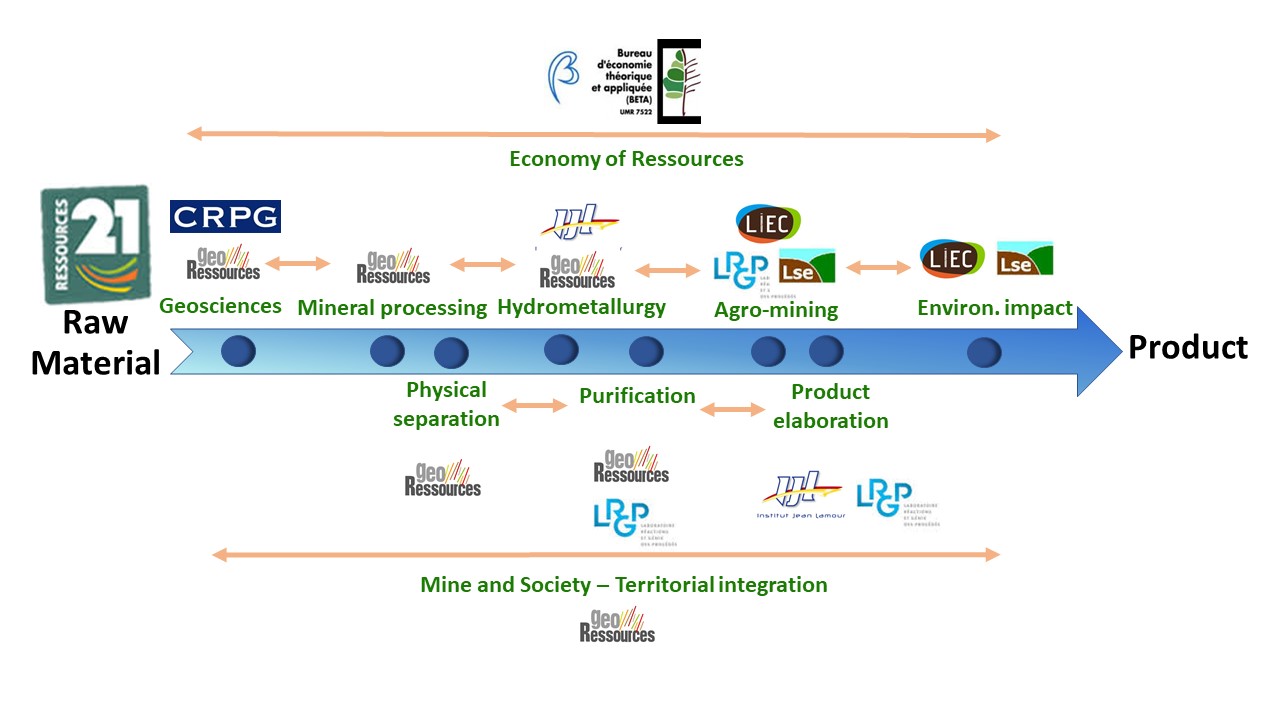
The LabEx RESSOURCES21 is surrounded by key industrial and institutional partners that can provide further assistance with its work, confirm results and improve visibility on a national and international level.
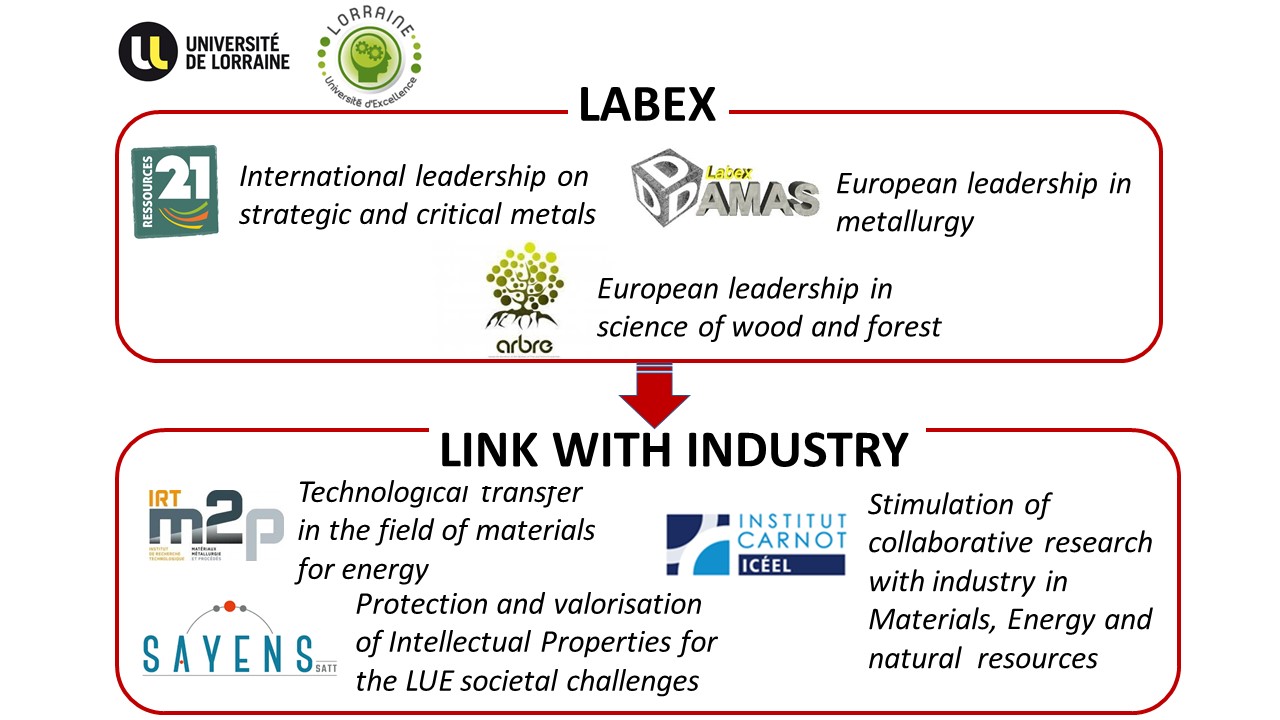
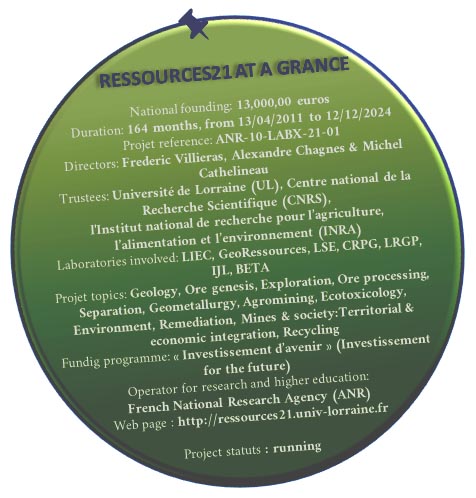
Links:
French National Research Agency
http://www.univ-lorraine.fr/content/programme-dinvestissements-davenir


